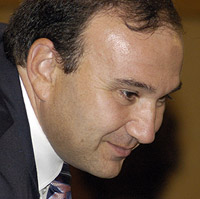Everyone knows that there are huge flaws in the education sector of Armenia. There is practically nobody who is satisfied with the school, university, and the post-university education, and the main reason for the low quality of the education and science sectors is the deeply rooted corruption. It is hard to imagine how the education/science sector is supposed to develop, how qualified experts are to be born, and how the educational resource of the country is supposed to leave a positive influence on the economy when today many, many people continue to receive grades based on a certain amount of money.
“We want to see the future of our country in the development of education and science,” said Levon Mkrtchyan, RA Minister of Education and Science, during the “Education 2015” conference held Monday at the “Tigran Mets” hall in the Marriott hotel. The conference, at which gathered nearly 230 delegates from different parts of the globe, is aimed at creating an educational field with a clear-cut strategy for 2008-2015, by which the country’s quality of education will correspond to that of the so-called “international standard”. The participants of the conference accepted that “we can no longer go slowly” and it is time to take action.
“We can get to the bottom of corruption if we want to. I have been in countries like Armenia where there were also issues concerning corruption. I want to see some corrupt people in jail. I want to see a tie between educational institutions. I don’t see any of this in Armenia,” said professor of the Wanderbilty university Steven Heineman, who has spent ten years of his career on issues concerning education and accrediting in Central Asia, North America and 27 countries of Europe and Asia. According to him, the most vulnerable point of the education field of Armenia is the system inherited from the USSR, which must go through radical reforms. In general, Soviet education is the main target for foreign experts, and they tie almost all of the failures in the education field to the USSR. Dean of the Information Department of Berkeley University, Anna Lee Saxonian, who had arrived to her grandparents’ homeland for the first time, also touched upon the flaws of the USSR educational system, noting that it was “restricted”, as the system must force one to think and be creative and independent.
“The emigration of talented youth from developing to developed countries has been traditionally observed as the “brain drain”, which sharpens the international imbalance and enriches the already great economies on the account of their poor colleagues,” our compatriot said in her speech. She is for the expression “circulation of brains” when the immigrant who has received an education abroad returns to his country and invests his knowledge in the development of the economy and education of his country. Saxonian even has a book on that is called “New Argonauts: the regional advantages of global economy”. The new Argonauts, unlike the mythological Argonauts, are the ones educated in the U.S. Anna Lee Saxonian is completely realistic towards this model of development, especially for a country that has a strong Diaspora. In response to our question as to whether Armenia will be able to provide normal conditions and salaries for these “Argonauts”, Education and Science Minister Levon Mkrtchyan said:
“Take Anna Lee as the first Argonaut.”
After summarizing the speeches and discussions that took place during the two-day conference, a policy will be formulated and presented to the government which will confirm it by October.
“After all, we are moving towards rating universities, when each university (private and state institutions) must present its results corresponding to these standards. Now, the status of past years is not going to save them,” said Mkrtchyan in an interview with “168 Hours”. According to him, now is a good time to develop the education field. Both government officials and the public are worried about the quality of education.
“The most important thing is that the public is ready to pay for education, thus, it is a disgrace if the officials of the education sector are incapable of providing quality education. The buyer spends less in order to educate his child. We are simply not conscientious sellers, because we don’t provide quality. The world is developing at a rapid pace and all officials, starting from the minister, must realize that and be able to keep this pace or leave it up to those who will be able to use this positive thing,” said the minister.
According to Mkrtchyan, the state examinations are in a very bad state. This year there will most definitely be experts in the field present during the state examinations, and who will supervise the exams.
“For example, if we have a state exam on economics, we must have a representative of the Ministry of Finance. If it is international relations, then it is a representative of the and they then test and evaluate. Now there will be order, and a specific commission will be created, which will examine the quality of the student. If the quality is low, then the faculty will have to answer to that,” said the minister, with the certainty that these kinds of commissions may have good results if university departments conduct similar meetings and studies on their own.

